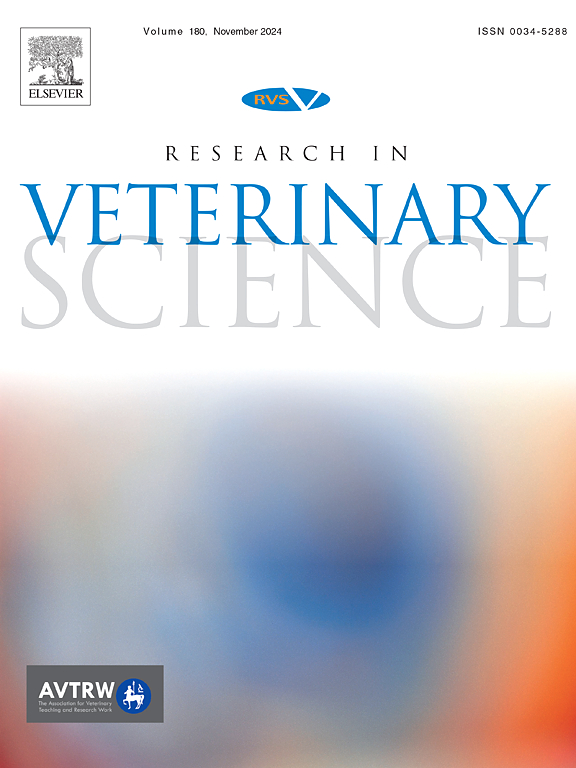Chicken hnRNPK suppresses interferon production, thereby enhancing IBDV replication
IF 1.8
3区 农林科学
Q1 VETERINARY SCIENCES
引用次数: 0
Abstract
Heterogeneous ribonucleoprotein K (hnRNPK) is a well-known RNA-binding protein initially identified for its role in inhibiting the growth of various human tumors. Members of the hnRNP family have also been implicated in both interferon production and RNA virus replication. However, the role of chicken hnRNPK (chhnRNPK) in the replication of Infectious Bursal Disease Virus (IBDV) remains unclear. In this study, we identified chhnRNPK as a protein that interacts with genomic double-stranded RNA (dsRNA). Following IBDV infection, chhnRNPK was recruited to the virus replication complex in the cytoplasm. Furthermore, chhnRNPK expression inhibited dsRNA-induced interferon production, specifically at the mitochondrial antiviral signaling protein (MAVS) step. Overexpression of chhnRNPK significantly enhanced virus replication, while knockdown of chhnRNPK increased dsRNA-induced interferon production and subsequently disrupted IBDV replication. Collectively, these findings suggest that chhnRNPK promotes IBDV replication by interacting with genomic dsRNA, highlighting a novel host factor that regulates viral replication.
鸡hnRNPK抑制干扰素的产生,从而增强IBDV的复制。
异质核糖核蛋白K (hnRNPK)是一种众所周知的rna结合蛋白,最初被发现在抑制各种人类肿瘤的生长中起作用。hnRNP家族的成员也参与干扰素的产生和RNA病毒的复制。然而,鸡hnRNPK (chhnRNPK)在传染性法氏囊病病毒(IBDV)复制中的作用尚不清楚。在这项研究中,我们发现chhnRNPK是一种与基因组双链RNA (dsRNA)相互作用的蛋白质。IBDV感染后,chhnRNPK被招募到细胞质中的病毒复制复合体中。此外,chhnRNPK表达抑制dsrna诱导的干扰素产生,特别是在线粒体抗病毒信号蛋白(MAVS)步骤。chhnRNPK的过表达显著增强了病毒的复制,而chhnRNPK的敲低增加了dsrna诱导的干扰素的产生,随后破坏了IBDV的复制。总的来说,这些发现表明chhnRNPK通过与基因组dsRNA相互作用促进IBDV的复制,突出了一种调节病毒复制的新型宿主因子。
本文章由计算机程序翻译,如有差异,请以英文原文为准。
求助全文
约1分钟内获得全文
求助全文
来源期刊

Research in veterinary science
农林科学-兽医学
CiteScore
4.40
自引率
4.20%
发文量
312
审稿时长
75 days
期刊介绍:
Research in Veterinary Science is an International multi-disciplinary journal publishing original articles, reviews and short communications of a high scientific and ethical standard in all aspects of veterinary and biomedical research.
The primary aim of the journal is to inform veterinary and biomedical scientists of significant advances in veterinary and related research through prompt publication and dissemination. Secondly, the journal aims to provide a general multi-disciplinary forum for discussion and debate of news and issues concerning veterinary science. Thirdly, to promote the dissemination of knowledge to a broader range of professions, globally.
High quality papers on all species of animals are considered, particularly those considered to be of high scientific importance and originality, and with interdisciplinary interest. The journal encourages papers providing results that have clear implications for understanding disease pathogenesis and for the development of control measures or treatments, as well as those dealing with a comparative biomedical approach, which represents a substantial improvement to animal and human health.
Studies without a robust scientific hypothesis or that are preliminary, or of weak originality, as well as negative results, are not appropriate for the journal. Furthermore, observational approaches, case studies or field reports lacking an advancement in general knowledge do not fall within the scope of the journal.
 求助内容:
求助内容: 应助结果提醒方式:
应助结果提醒方式:


